Nottingham University - The Millennium Garden
w/e 04 July 2010
All this week's pictures were taken
with a Kodak DX6490
It is commonplace now for schools to be surrounded
by unclimbable fences and locked gates and I've always considered
Nottingham University with its gate houses and traffic barriers
to be similarly out of bounds. I believe many people are of the
same opinion but the fact is that the grounds are open to the
public and it is possible to wander freely about the campus and
enjoy the gardens of which there are several in different styles.
We'll focus here on the Millennium Garden, planning for which
began in 1998 but hope to return for more visits to explore other
areas of the campus. Lord Dearing, former Chancellor of the University,
formally opened the garden on Tuesday 4 July 2000.
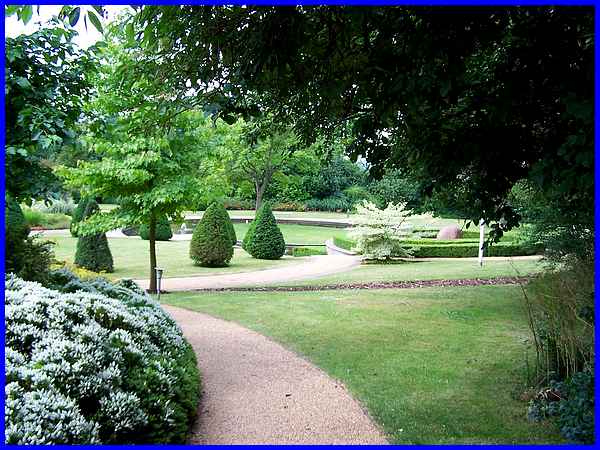
A free leaflet is available at each of the gate houses and most
of the information to accompany these images has been drawn from
one such leaflet. The section of the leaflet on the Millennium
Garden states that it "is the jewel in our horticultural
crown" being "a quiet, reflective place for students
and staff amidst the 'busyness' of a major university campus."
It came about as the winning entry in a design competition and
is based on a time theme featuring a series of interconnecting
circular pathways.
|
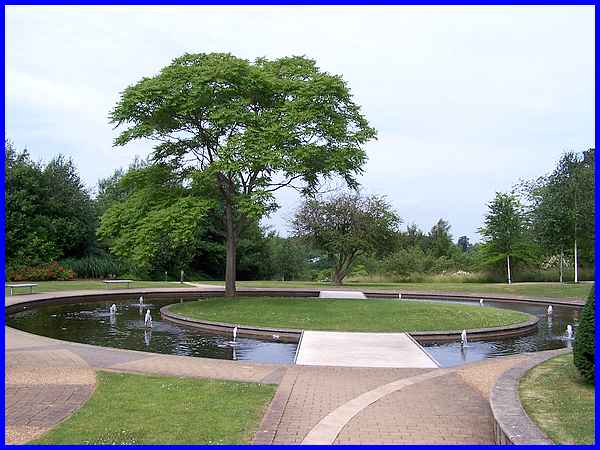
The circular pathways are supplemented by a similar shaped formal
pool and island upon which stands an existing Tree of Heaven
which was incorporated into the design to be a focal point in
the garden. The island can be accessed by two low steel bridges
and a dozen fountains in the pool "tell the time".
|
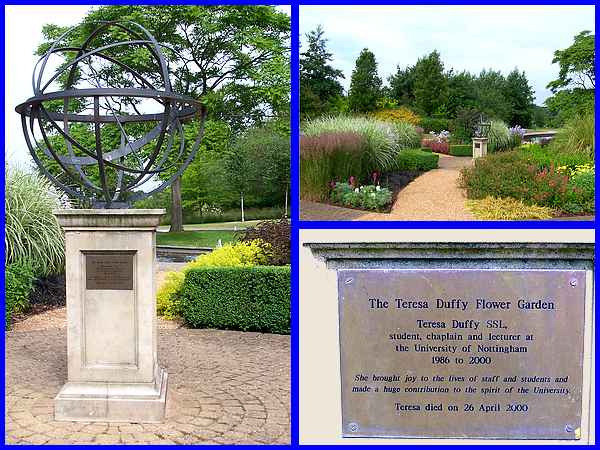
Another focal point in the garden is an Armillary Sphere set
in the centre of the Teresa Duffy Flower Garden which is a colour
garden designed to have interesting flowers and foliage at all
seasons.
|
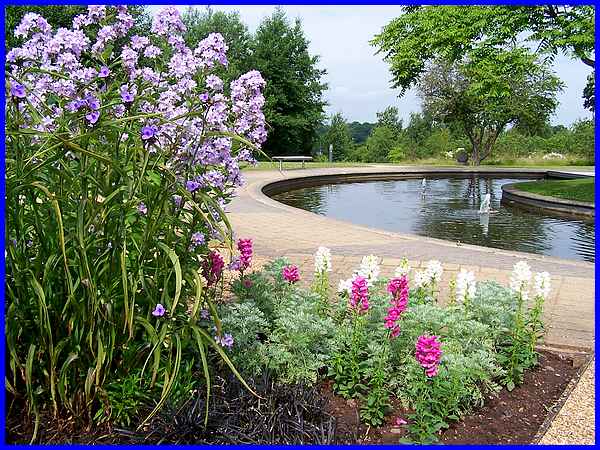
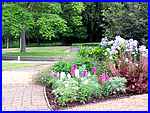 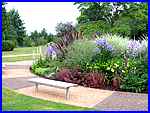 The time theme is continued in the flower
garden by using different colours to illustrate a day/night scheme.
One bed contains hot red, orange and yellow colours whilst another
has cool blues, whites and silvers. Ample seating is available
on all sides of the flower garden (and elsewhere) which enables
students, staff and the general public of course to sit and enjoy
the colours whatever their mood. The time theme is continued in the flower
garden by using different colours to illustrate a day/night scheme.
One bed contains hot red, orange and yellow colours whilst another
has cool blues, whites and silvers. Ample seating is available
on all sides of the flower garden (and elsewhere) which enables
students, staff and the general public of course to sit and enjoy
the colours whatever their mood.
|
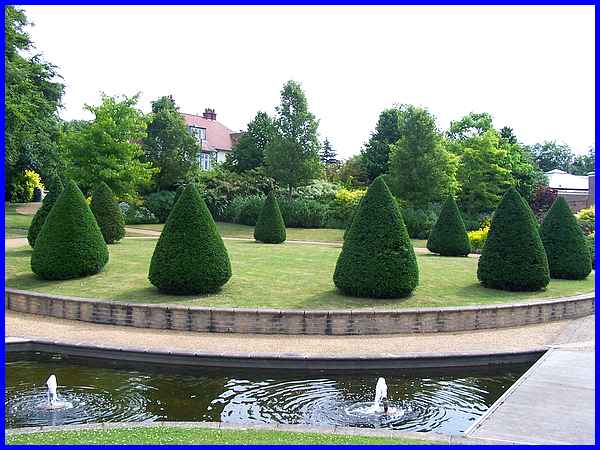
In contrast to the flower garden is a circular grassed area surrounded
by twelve sentinel yews again paying homage to the time theme.
It also provides a less formal seating area and can be used as
a small open-air performance site. Various events are held in
the Millennium Garden throughout the year.
|
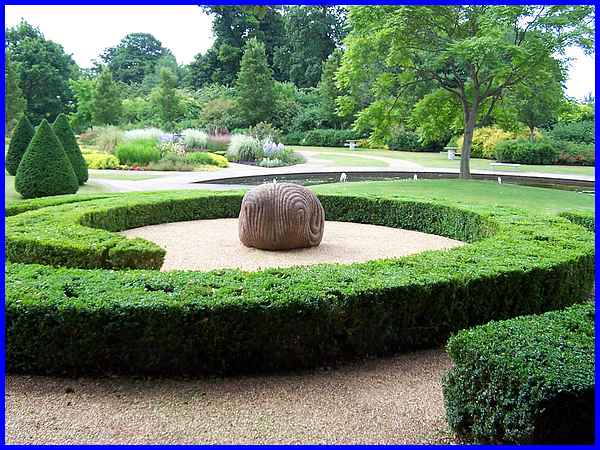
A high point in the garden is the top of a raised mound with
clipped box hedges. Overlooking the pool the centre point of
the mound is a stone sculpture by Peter Randall-Page. The sculpture
was carved from a single piece of glacial granite and is titled
'Flayed Stone' and closer inspection of it is possible even for
disabled visitors in wheelchairs by following the path between
the box hedges.
|
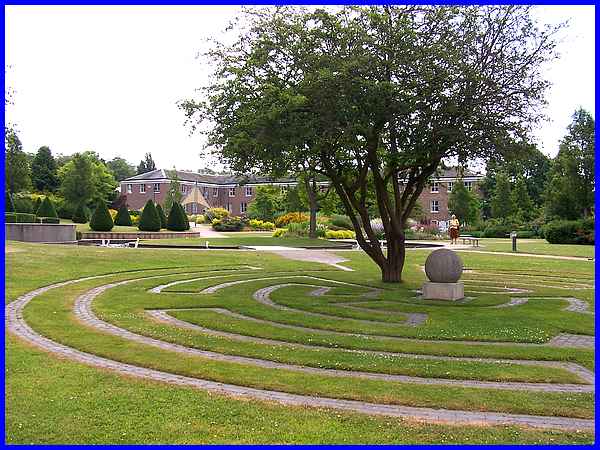
Following another path is not quite as straightforward as the
blue bricks set in the turf form a maze. To quote from the aforementioned
leaflet: "This ancient garden feature symbolises the rooting
of knowledge in antiquity."
|
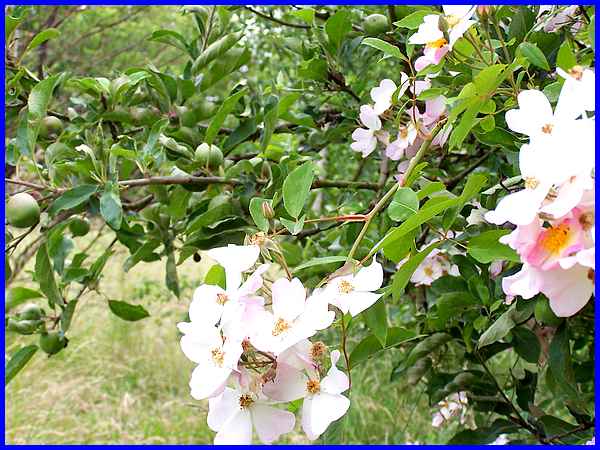
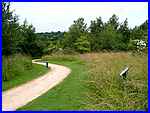 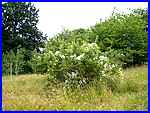 Several paths lead from the garden and one of
them (left) from the maze offers views over "the meadows
to the halls of residence and distant housing. Here the design
emphasises the University's open attitude to learning and knowledge
and its involvement in the wider community." It is also
at the side of this path that there is an old Bramley orchard
(right) where rambler roses grow through the trees (above). Several paths lead from the garden and one of
them (left) from the maze offers views over "the meadows
to the halls of residence and distant housing. Here the design
emphasises the University's open attitude to learning and knowledge
and its involvement in the wider community." It is also
at the side of this path that there is an old Bramley orchard
(right) where rambler roses grow through the trees (above).
This path is just one that's an invitation to explore more of
the gardens on the campus and that's an invitation we'll probably
accept another day.
|

